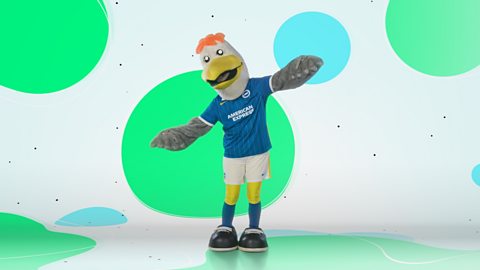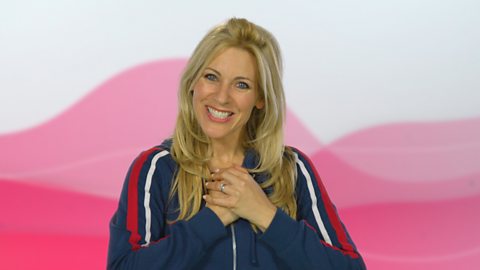karim Zeroual:
Ah, what a wonderful world. Let's take some time to notice it and make sure that we take care of it.
Our blue and green world, it keeps spinning in space and we fly around the sun at a super fast pace. Look to the stars. Can you count them with me? There's so many to count here. How many stars can you see? Look, there's some clouds. Maybe they'll bring some rain.
They're all coming and going. We hope they're coming again. Feel the cold wind as the snowfall begins or the warmth of the sun has a chance on your skin.
What a wonderful world. What a wonderful land. Let's take care of it now. Give a warm helping hand. (Oohoohoo)
Respect the world around us showing that we care. (Oohoohoo)
Give love to all of nature so it stays there. So what ways can we help the planet? Can you think of any?
Please don't drop any litter. Put it all in the bin. If you can please recycle so the planet can win. We're all sharing this earth, so please keep that in mind. Don't be destructive or cruel. Be constructive and kind.
The birds in the sky, and the whales in the sea, the bears and the fishes and the partners and bees. We need to care for this Earth or they might fade away. We're all in this together. And we're in this today.
What a wonderful world, what a wonderful land. Let's take care of it now. Give a warm helping hand.
(Oohoohoo)
Respect the world around us, showing that we care.
(Oohoohoo)
Give love to all of nature so it stays there.
(Oohoohoo)
Protect the world around us, it needs to be done. (Ohoohoo).
We'll make it brighter future here for everyone.
Pudsey and Karim Zeroual perform this larger-than-life Super Mood Movers song about the importance of taking care of the world around us.
After viewing, singing and dancing along, your class could try some of these activities to further explore their learning:
Activities
- Why do we need to take care of our world?: Ask pupils to name the things they heard about in the song that they like in our world. Do they have a favourite outside place? Do they have a favourite animal? A favourite tree? Ask pupil to draw something in the world they think is beautiful. Tell them: 'Sometimes people get so greedy, or are in such a hurry to do things, that they don't leave room for nature. We all need to be careful and to make sure we don't damage our world, its animals and its plants.'
- How do people try to take care of our world?: Ask - 'How do people try to take care of our world?' Encourage pupils to share their ideas, which might include: not leaving litter but putting it in the bin; walking and cycling as much as we can to cut down on fumes from cars; planting trees; keeping corners of parks and gardens wild to give space for plants and animals.
- Recycle sorting: Ask pupils to take turns to sort items of packaging into household recycling boxes (make sure the packaging is clean and safe to use, don't allow children to handle glass or sharp-edged tins: you could place items such as this in a recycle box yourself, at the children's direction).
- Bird-feeders: Pupils could help put up and top-up bird feeders around the school and keep a chart to show the types and numbers of birds attracted to them.
- Bug hotels: Pupils could tie or weave twigs together to make 'bug hotels' and place them in outside areas of the school. They could again keep a chart to show the types and numbers of mini-beasts that are attracted to their bug hotels.
- Planting seeds: Pupils could plant sunflower seeds, tend them and watch them germinate. They could plant out the seedlings and measure the growth of their sunflowers. At the end of the growing season, they could harvest the seeds for their bird-feeders.
- Noticing nature: Pupils could adopt a 'favourite tree' and draw it. Encourage the children to notice details of their trees over a period of time: blossom, new leaves, animals drawn to the trees, fruit, fallen leaves. Pupils could make leaf-pattern designs or bark-pattern rubbings to display in the classroom. As children go about these tasks, ask: 'How does taking time to notice nature help us in our lives?' Gather pupils' responses and guide them to the idea that connecting with the natural world can help to boost our mood our mental wellbeing. Ask: 'Are there other places or times in the day you could take a moment to notice nature?' List children' suggestions, such as: counting birds on the way to school, or noticing cloud shapes, or stars in the sky.
- Poems: Give pupils the opening lines of a poem about caring for our world and ask them to write the rest of the verse: 'Whales in the sea, birds in the air / Nature all around us needs our care.'
Learning aims or objectives
The Super Mood Movers song Taking Care Of Our World and these activity notes address the following learning objectives from the curriculum guidance of the four UK nations.
England, PHSE and RSE
From the PSHE Association programme of study:
- L2. how people and other living things have different needs; about the responsibilities of caring for them.
- L3. about things they can do to help look after their environment.
From the RSE guidance:
- Mental wellbeing:
- The benefits of physical exercise and time outdoors on mental wellbeing and happiness.
Northern Ireland, PD&MU
From the Northern Ireland curriculum for Personal Development and Mutual Understanding:
- Learning to live as members of a community: KS1 (Strand 2):
- Understand how their environment could be made better or worse to live in and what contribution they can make.
Scotland, PSE
From the Education Scotland Personal and Social Education benchmarks:
- Health and wellbeing: know that being active is a healthy way to be (HWB 0-27a).
- I am aware of the role physical activity plays in keeping me healthy (HWB 1-27a).
- Social wellbeing: Through contributing my views, time and talents, I play a part in bringing about positive change in my school and wider community (HWB 0-13a / HWB 1-13a).
CfE Citizenship themes:
- Develop knowledge and understanding of the world and Scotland's place in it; make informed choices and decisions.
- Evaluate environmental issues; learn how communities work and how good citizens enhance the quality of community life (for example through environmental work).
Wales, PSE
From the Personal and Social Education Framework for 7 to 19-year-olds in Wales:
- Sustainable development and global citizenship:
- To appreciate the natural world as a source of inspiration.
- Take an active interest in varied aspects of life in school and the wider environment; to understand.
- How the environment can be affected by the decisions we make individually and collectively; that local actions have global effects because of connections between places and people.

More from Super Mood Movers:
Fit and well. video
Brighton & Hove Albion mascot Gully the Seagull performs this upbeat Super Mood Movers song about the importance of staying fit and well.

Friends and family. video
Pudsey performs this toe-tapping Super Mood Movers song which offers a huge 'big up' to our friends and family.

Coping with feelings. video
Rhys Stephenson performs this touching Super Mood Movers song about different feelings.

Being happy and safe. video
Naomi Wilkinson performs this uplifting Super Mood Movers song about being happy and staying safe.

Ways to learn and play. video
Rhys Stephenson performs this energetic Super Mood Movers song about learning through play.
